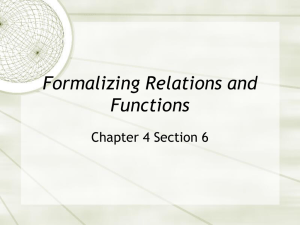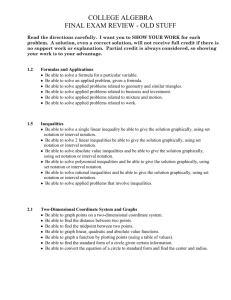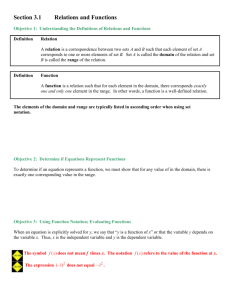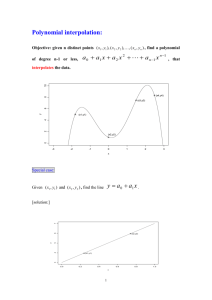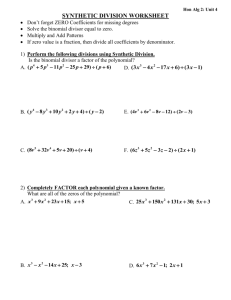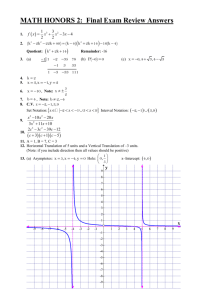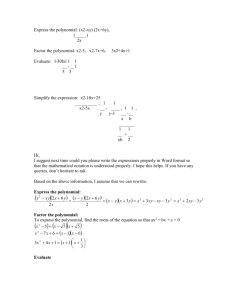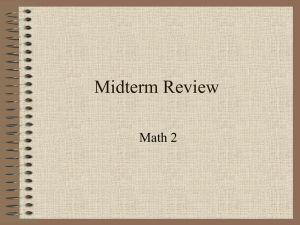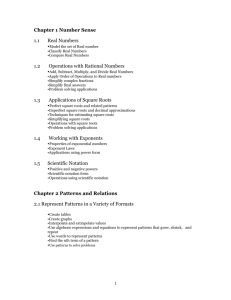exam i review - Linn-Benton Community College
advertisement
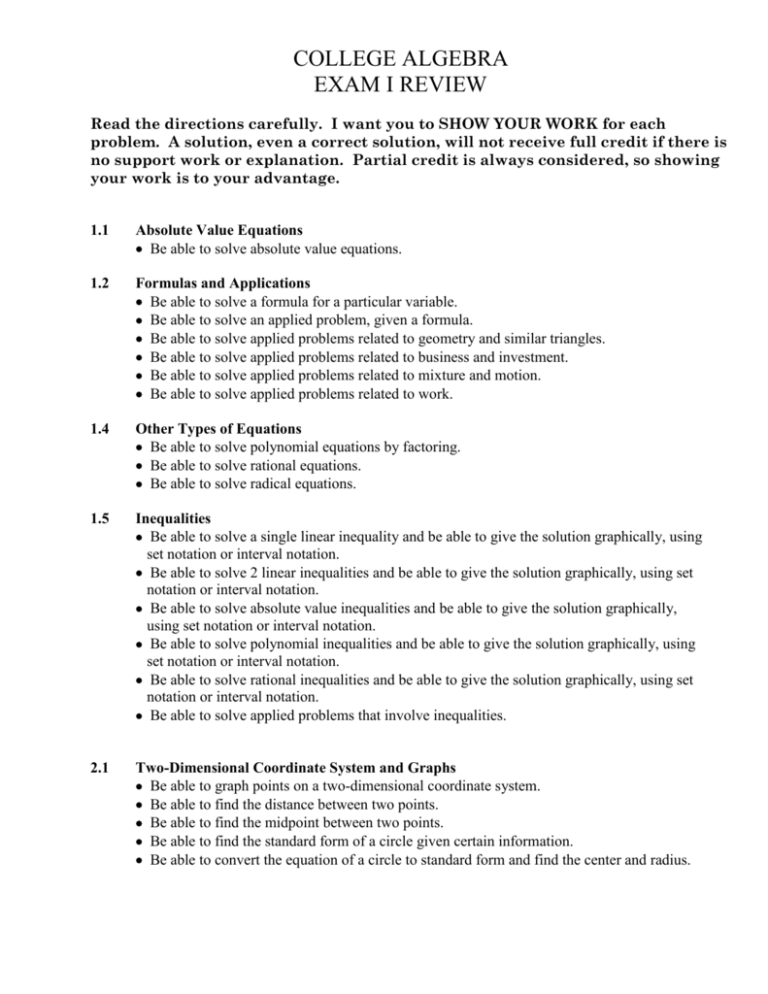
COLLEGE ALGEBRA EXAM I REVIEW Read the directions carefully. I want you to SHOW YOUR WORK for each problem. A solution, even a correct solution, will not receive full credit if there is no support work or explanation. Partial credit is always considered, so showing your work is to your advantage. 1.1 Absolute Value Equations Be able to solve absolute value equations. 1.2 Formulas and Applications Be able to solve a formula for a particular variable. Be able to solve an applied problem, given a formula. Be able to solve applied problems related to geometry and similar triangles. Be able to solve applied problems related to business and investment. Be able to solve applied problems related to mixture and motion. Be able to solve applied problems related to work. 1.4 Other Types of Equations Be able to solve polynomial equations by factoring. Be able to solve rational equations. Be able to solve radical equations. 1.5 Inequalities Be able to solve a single linear inequality and be able to give the solution graphically, using set notation or interval notation. Be able to solve 2 linear inequalities and be able to give the solution graphically, using set notation or interval notation. Be able to solve absolute value inequalities and be able to give the solution graphically, using set notation or interval notation. Be able to solve polynomial inequalities and be able to give the solution graphically, using set notation or interval notation. Be able to solve rational inequalities and be able to give the solution graphically, using set notation or interval notation. Be able to solve applied problems that involve inequalities. 2.1 Two-Dimensional Coordinate System and Graphs Be able to graph points on a two-dimensional coordinate system. Be able to find the distance between two points. Be able to find the midpoint between two points. Be able to find the standard form of a circle given certain information. Be able to convert the equation of a circle to standard form and find the center and radius. 2.2 Introduction to Functions Be able to determine whether a relation is a function when it is given as a table, a graph or a formula. Be able to evaluate a function at a particular value or expression. Be able to find the domain for a given function. Be able to find the zero for a given function. 2.5 Properties of Graphs Be able to translate (left, right, up, down), reflect (across the x or y axis), and compress or stretch vertically a given relation in the form of a graph or equation. Be able to test a relation or function for the three types of symmetry (x-axis, y-axis, origin). Be able to determine whether a function is even or odd or neither. 2.6 Algebra of Functions Be able to add, subtract, multiply or divide two given functions, find their domains, and evaluated them for value(s) of x. Be able to find the difference quotient for a given function. Be able to compose two given functions, find their domains, and evaluated them for value(s) of x. 3.1 Remainder Theorem and Factor Theorem Be able to use long division to divide a polynomial function by a polynomial divisor. Be able to use synthetic division to divide a polynomial function by a linear divisor. Be able to use the Remainder Theorem and synthetic division to evaluate a function at a particular value(s) of x. Be able to use synthetic division to show that a particular value of x is a zero of a polynomial. Be able to use synthetic division to determine if a given binomial is a factor of a polynomial. Be able to use synthetic division to factor a polynomial given one of the factors of the polynomial. Chapter 1 Review 5, 7, 9, 11, 23, 25, 27, 29, 31, 33, 35, 41, 43, 45, 47, 51, 53, 55, 59, 65, 67, 69, 71, 77 Chapter 1 Test 2, 8, 9, 11, 12, 14, 15, 16, 17, 18, 19, 20, 21 Chapter 2 Review 1, 2, 3, 13, 14, 15, 16, 17, 19, 21, 23, 25, 27, 33, 71, 73, 75, 77, 79, 81, 83, 87, 89, 91, 96, 97, 100, 101 Chapter 2 Test 1, 3, 4, 5, 6, 12, 13, 16, 18, 19, 20 Chapter 3 Review 1 – 11 odd Chapter 3 Test 1 – 3
